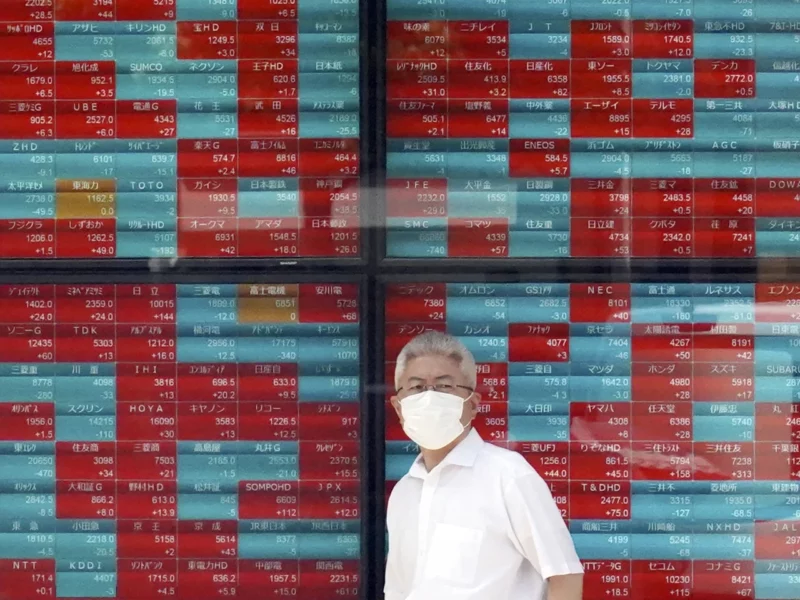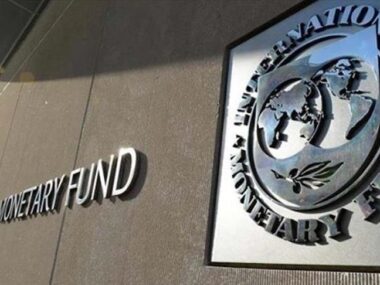Asian stocks largely fell Tuesday due to concerns over a potential US government shutdown and China’s struggling economy.
The key Nikkei 225 index for Japan decreased 0.6% in early trading to reach 32,469.85. The S&P/ASX 200 index for Australia fell 0.5% to 7,042.50. The Kospi in South Korea decreased by almost 1.0% to 2,471.30. Shanghai Composite dropped 0.2% to 3,110.86, while Hong Kong’s Hang Seng lost 0.9% to 17,578.90.
Investors are waiting for the publication of Chinese economic figures later this week.
According to Tina Teng, market analyst at CMC Markets APAC & Canada, “the Chinese real estate woes are far from over, as the notorious developer Evergrande defaulted on its 4 billion yuan onshore bond repayment and delayed the restructuring meetings.”
Some of Wall Street’s significant losses from the previous week were recovered. After its worst week in six months, the S&P 500 increased 17.38, or 0.4%, to 4,337.44. The Nasdaq composite rose 59.51, or 0.5%, to 13,271.32 and the Dow Jones Industrial Average increased 43.04, or 0.1%, to 34,006.88.
The likelihood that the Federal Reserve will maintain high interest rates well into next year is beginning to seep in. The Fed announced last week that it is likely to reduce interest rates in 2024 by less than initially anticipated in an effort to ensure that high inflation returns to its target level. Since 2001, the primary interest rate has never been higher.
Bond market yields have reached their greatest peaks in more than a decade as a result of the growing perception that rates will remain higher for a longer period of time. As a result, investors become less ready to pay high sums for any form of investment, especially one that is perceived as being the most expensive or requiring its owners to wait the longest for significant growth.
Late on Friday, the yield on the 10-year Treasury increased to 4.53% from 4.44%, which is close to the highest point since 2007. That represents a significant increase from 0.50% three years ago and from over 3.5% in May.
“Stocks digest gradual, growth-driven increases in interest rates far better than rapid increases driven by other factors such as inflation or Fed policy,” according to a paper by Goldman Sachs analysts under the direction of David Kostin.
The first in a lengthy list of worries weighing on Wall Street are higher yields. Oil prices have increased by $20 a barrel since June, and economies all over the world now appear fragile. The U.S. economy’s biggest strength—household spending—could be weakened by the resumed repayment of student loans.
The United States government might experience another shutdown soon as a result of fresh political squabbles on Capitol Hill. But Wall Street has survived prior shutdowns, and “history shows that past ones haven’t had much of an impact on the market,” claims Chris Larkin, managing director of trading and investing at E-Trade from Morgan Stanley.
Amazon saw a 1.7% increase on Wall Street and was the main driver of the S&P 500’s upward movement. The business made a $4 billion investment in Anthropic, taking a minority position in the firm in artificial intelligence. In the drive to capitalize on opportunities that the newest generation of the technology is anticipated to fuel, it is the most recent Big Tech corporation to pump money into AI.
Following a tentative agreement that unionized screenwriters reached on Sunday to terminate their historic strike, stocks of media and entertainment industries were divided. Actors on strike have not yet reached a settlement.
The Walt Disney Company fell 0.3% while Netflix increased 1.3%. In the S&P 500, Warner Brothers Discovery’s 4% decline represented the day’s biggest loss.
Stocks of businesses involved in travel suffered losses on Wall Street as well due to concerns over rising fuel prices. Norwegian Cruise Line dropped 3.1%, and Southwest Airlines dropped 2%.
Benchmark U.S. crude fell 7 cents to $89.61 a barrel in the energy market. The benchmark crude, Brent, dropped 14 cents to $93.15 a barrel. Exxon Mobil increased by 1.1% on Wall Street, while ConocoPhillips increased by 1.6%. Since the start of the summer, oil prices have soared.
American dollars traded at 148.93 Japanese yen, up from 148.84 yen. Down from $1.0594, the price of the euro was $1.05.











